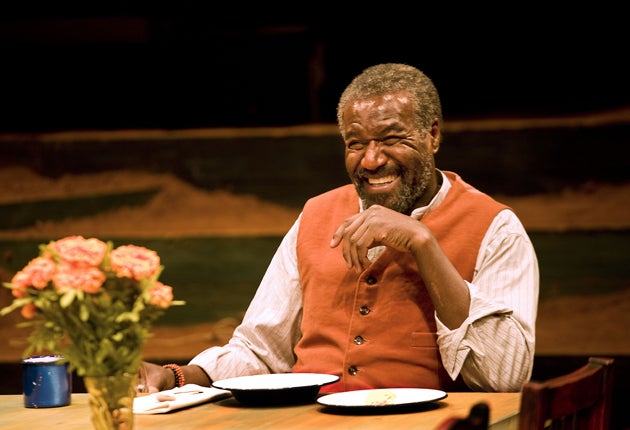Joe Turner's Come and Gone, Young Vic, London
Arresting but quite hard work

Your support helps us to tell the story
From reproductive rights to climate change to Big Tech, The Independent is on the ground when the story is developing. Whether it's investigating the financials of Elon Musk's pro-Trump PAC or producing our latest documentary, 'The A Word', which shines a light on the American women fighting for reproductive rights, we know how important it is to parse out the facts from the messaging.
At such a critical moment in US history, we need reporters on the ground. Your donation allows us to keep sending journalists to speak to both sides of the story.
The Independent is trusted by Americans across the entire political spectrum. And unlike many other quality news outlets, we choose not to lock Americans out of our reporting and analysis with paywalls. We believe quality journalism should be available to everyone, paid for by those who can afford it.
Your support makes all the difference.The sand between your toes at the Young Vic – on stage and in the auditorium – is the red earth of Pittsburgh in the early years of the last century, as the migrant blacks arrive from the slave gangs in the south to beat out a life on the land their labour has subsidised.
Themes of possession and dynastic come-uppance run like a vein through the extraordinary series of 10 plays written by August Wilson (who died in 2005), many of them a unique blend of the real and spiritual, and all rich in stories and the poignant legacies of a tumultuous history.
This play, first performed on Broadway in 1988, and given its British premiere two years later at the Tricycle in Kilburn, is the fifth in the series, and one of Wilson's best. He evoked the 1911 Pittsburgh boarding house with uncanny precision and humour, then transformed it into a prayer meeting and voodoo chamber in a blitz on the collective memory of slavery.
The Young Vic revival, directed by David Lan, doesn't quite pull off this difficult balance between the everyday routine and the magic realism in the incantatory speeches of rootsman Bynum – played by the visiting American actor Delroy Lindo, a truly charismatic presence; and its sense of period is (perhaps deliberately) shaky.
But the air hums with the blues, the heat is suffocating, and the characters line up their songs of themselves with a growing confidence and swagger. There's the young boy who's building a bridge, the visiting white blue-collar worker commissioning tin pots from the landlord, the new girl from the sticks with her suitcases and quest for "company".
And there's Herald Loomis, the strangely wired, disoriented church deacon who is roaming Pittsburgh in search of his wife, with a demure and timid daughter in tow. Loomis has spent seven years on Joe Turner's slave gang, one of the victims of a kidnap policy that was common in the south and ratified by the white politicians; Joe Turner's brother was governor of Tennessee. Loomis has become separated from his own identity, as well as his wife, and the play gathers force in a sort of healing process, with a juba dance banged out on the kitchen table and Bynum delivering a great speech – that could serve as Wilson's own testament – of how he rescued a song that his father had given him and dredged it from his own memory and made it smooth.
It's instructive to see, a full century before the advent of Barack Obama, how the black migrant community was adjusting to new opportunities while still shackled in the past. The strange travelling couple of Herald and his daughter, frozen in their overcoats, it seems, are beautifully played by Kobna Holdbrook-Smith and Leah Ocran, and Lan's company includes good work, too, from Danny Sapani and Adjoa Andoh as the hosts, Daniel Cerqueira as a local pedlar (the one white character) and Petra Letang as a girl with two suitcases and a penchant for "company".
To 3 July (020-7922 2922)
Join our commenting forum
Join thought-provoking conversations, follow other Independent readers and see their replies
Comments